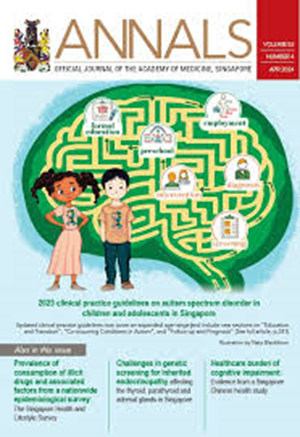与深度浸润性子宫内膜异位症、子宫腺肌病和卵巢子宫内膜异位瘤相关的因素。
IF 5.2
4区 医学
Q2 Medicine
引用次数: 0
摘要
目的:比较深浸润性子宫内膜异位症与子宫内膜异位症和子宫腺肌症的流行病学特征和临床表现,并确定各自组织学证实的危险因素。方法使用手术程序表编码从医院数据库中识别2015年至2021年7年间在新加坡国立大学医院接受子宫内膜异位症或子宫腺肌症手术的患者。比较组织学确诊为单纯子宫内膜异位症、单纯子宫内膜异位症和深浸润性子宫内膜异位症的社会和流行病学特征。将单因素分析的显著变量纳入3个二元多因素logistic回归模型,获得深度浸润性子宫内膜异位症与单纯子宫内膜异位症、深度浸润性子宫内膜异位症与单纯子宫腺肌症、单纯子宫腺肌症与单纯子宫内膜异位症的独立危险因素。结果共纳入258例患者,其中卵巢子宫内膜异位症59例,子宫内膜异位症47例,深浸润性子宫内膜异位症152例。与单纯的子宫内膜异位症相比,深度浸润性子宫内膜异位症与更高的严重痛经发生率(比值比[OR] 2.80, 95%可信区间[CI] 1.02-7.70)和自费私人手术护理(比值比[OR] 4.72, 95% CI 1.85-12.04)相关。与仅子宫腺肌症相比,深度浸润性子宫内膜异位症与较高的生育意愿(OR 13.47, 95% CI 1.01-180.59)和较低的体重指数(OR 0.89, 95% CI 0.79-0.99)相关。相比之下,大量月经出血是子宫腺肌症的标志,在子宫内膜异位症患者中不太常见。结论深浸润性子宫内膜异位症伴严重痛经、泌尿道及胃肠道疼痛、生育意愿高、不孕率高。有疼痛症状和生育能力低下的患者应尽早转诊到有能力诊断和处理深浸润性子宫内膜异位症的三级中心。本文章由计算机程序翻译,如有差异,请以英文原文为准。
Factors associated with deep infiltrating endometriosis, adenomyosis and ovarian endometrioma.
INTRODUCTION
To compare epidemiological features and clinical presentations of deep infiltrating endometriosis with endometrioma and adenomyosis, as well as to identify risk factors for the respective histologically confirmed conditions.
METHOD
Patients undergoing index surgery at the National University Hospital, Singapore for endometriosis or adenomyosis over a 7-year period-from 2015 to 2021-were identified from hospital databases using the Table of Surgical Procedures coding. Social and epidemiological features of cases with histologically confirmed diagnoses of endometrioma only, adenomyosis only, and deep infiltrating endometriosis were compared. Significant variables from univariate analysis were entered into 3 binary multivariate logistic regression models to obtain independent risk factors for: deep infiltrating endometriosis versus endometrioma only, deep infiltrating endometriosis versus adenomyosis only, and adenomyosis only versus endometrioma only.
RESULTS
A total of 258 patients were included with 59 ovarian endometrioma only, 47 adenomyosis only, and 152 deep infiltrating endometrioses. Compared to endometrioma only, deep infiltrating endometriosis was associated with higher rates of severe dysmenorrhoea (odds ratio [OR] 2.80, 95% confidence interval [CI] 1.02-7.70) and out-of-pocket private surgical care (OR 4.72, 95% CI 1.85-12.04). Compared to adenomyosis only, deep infiltrating endometriosis was associated with a higher fertility desire (OR 13.47, 95% CI 1.01-180.59) and a lower body mass index (OR 0.89, 95% CI 0.79-0.99). In contrast, heavy menstrual bleeding was the hallmark of adenomyosis, being less common in patients with endometriosis.
CONCLUSION
Deep infiltrating endometriosis is associated with severe dysmenorrhoea, pain related to urinary and gastrointestinal tracts, higher fertility desire and infertility rate. Patients with pain symptomatology and subfertility should be referred early to a tertiary centre with the capability to diagnose and manage deep infiltrating endometriosis.
求助全文
通过发布文献求助,成功后即可免费获取论文全文。
去求助
来源期刊

Annals Academy of Medicine Singapore
医学-医学:内科
CiteScore
4.90
自引率
5.80%
发文量
186
审稿时长
6-12 weeks
期刊介绍:
The Annals is the official journal of the Academy of Medicine, Singapore. Established in 1972, Annals is the leading medical journal in Singapore which aims to publish novel findings from clinical research as well as medical practices that can benefit the medical community.
 求助内容:
求助内容: 应助结果提醒方式:
应助结果提醒方式:


